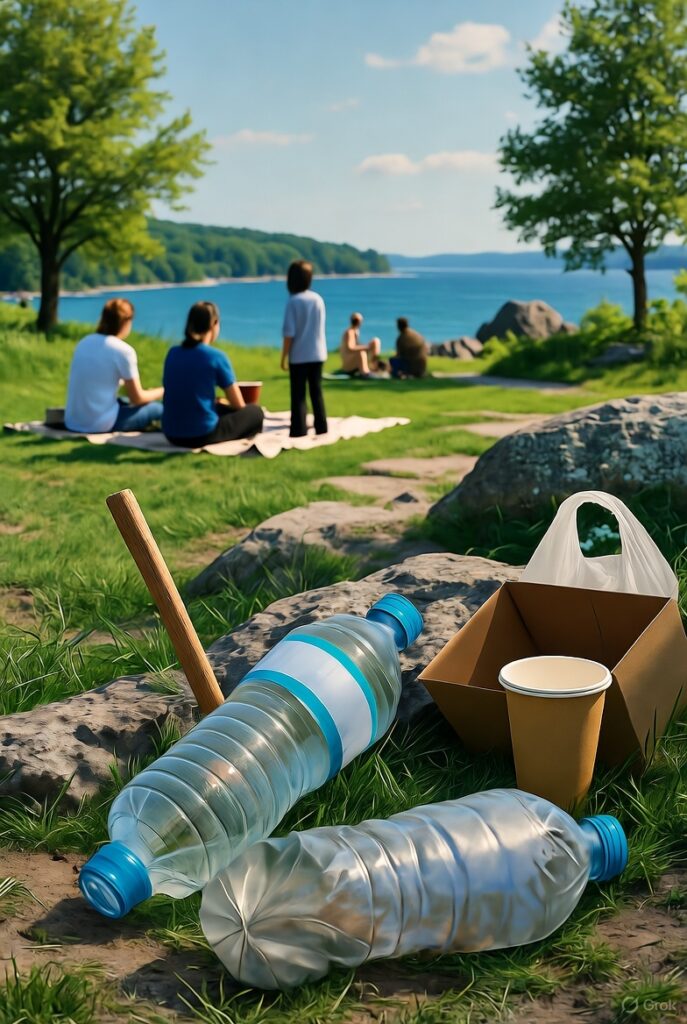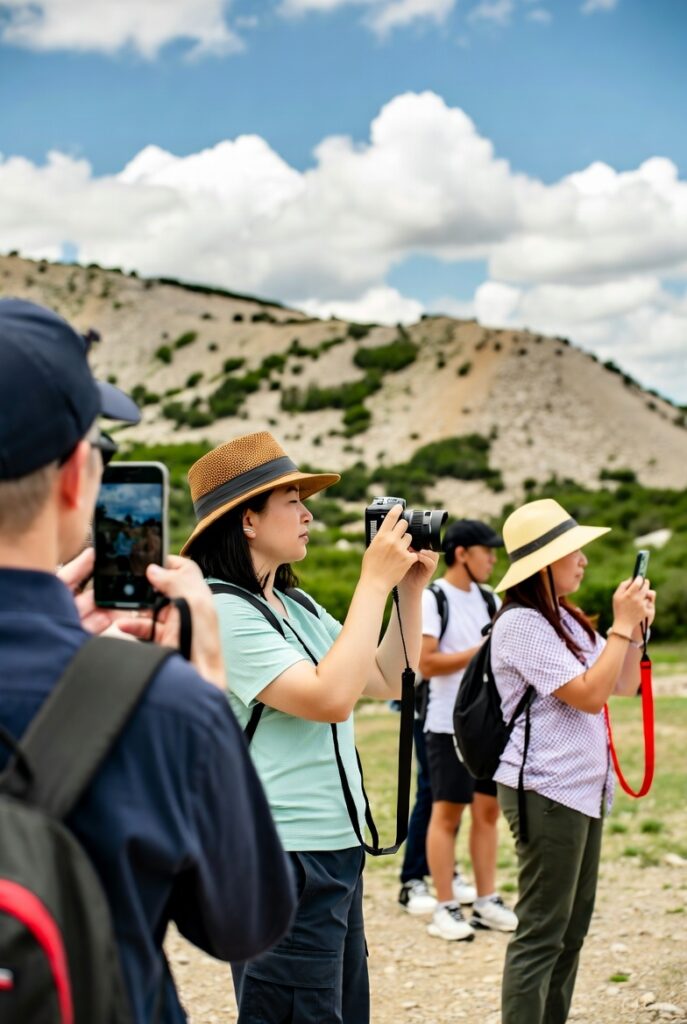- greenwashing, fake ‚eco-tourism‘?
2. Fake eco-tourism (greenwashing)
Some companies say they are “eco-friendly,” but they do not help the environment or local communities. For example, a hotel may say it is eco, but it uses too much water or electricity. Or a tour may advertise nature experiences, but it damages the forest or wildlife. Tourists may think they are doing something good for nature, but the real impact can be negative.

#######################
Some companies say they offer eco-tourism, but in reality, they only pretend to care about nature. This is called greenwashing. It means they use words like “eco-friendly” or “sustainable” to attract tourists, but they do not really help the environment or local people.
For example, a hotel might say it is an “eco-hotel,” but it still wastes a lot of water and electricity every day. It may also use plastic bottles and not recycle them. A tour company may promote “nature tours,” but the tours may hurt the forest, scare animals, or leave trash behind.
Many tourists believe they are doing something good for the planet when they join these activities. They think their visit supports clean tourism and helps local communities. However, the truth is often different. Sometimes the money only goes to the company, not to the local people. The environment can also become worse because of careless actions.
To avoid fake eco-tourism, travelers should check carefully before booking. They can look for real certificates, ask questions about how the company protects nature, and choose tours that respect people, animals, and the environment. True eco-tourism means helping both nature and local communities in a positive and honest way.
________________________
Vocabulary:
- to offer eco-tourism – to give tourists trips that try to protect nature
- to pretend to care for nature – to say you love nature but not really mean it
- greenwashing – when a company says it helps nature but it doesn’t
- sustainable – something that can last a long time without hurting nature
- to attract tourists – to make people want to come and visit
- environment – the world around us, like air, water, plants, and animals
- to waste water – to use too much water or use it for no reason
- to recycle – to use things again instead of throwing them away
- to promote tours – to tell people about trips so they want to go
- to hurt nature – to damage plants, trees, or animals
- to scare animals – to make animals afraid
- trash – things we throw away, like bottles or paper
- to join an activity – to take part in something fun or interesting
- to support – to help someone or something
- a community – a group of people living in the same place
- a careless action – something done without thinking that causes problems
- to avoid – to stay away from something
- a certificate – an official paper that shows something is true
- to choose a tour – to pick which trip you want to go on
- to respect nature – to care for and protect the environment
- to be honest – to tell the truth and not lie
################
Multiple Choice Test:
- To offer eco-tourism means …
a) to give trips that help nature
b) to talk about food tours
c) to sell plane tickets - To pretend to care for nature means …
a) to really help the forest
b) to say you care but not mean it
c) to plant many trees - Greenwashing means …
a) painting a hotel green
b) cleaning rivers and beaches
c) saying you help nature but not really doing it - Sustainable means …
a) easy to plan and short
b) good for nature for a long time
c) cheap for tourists to buy - To attract tourists means …
a) to make people want to visit
b) to tell people not to travel
c) to make trips boring - The environment is …
a) a small park near a hotel
b) the world around us like air and water
c) the inside of a building - To waste water means …
a) to use too much for no reason
b) to clean with rainwater
c) to save every drop - To recycle means …
a) to throw away plastic
b) to buy new bottles
c) to use things again - To promote tours means …
a) to go alone in the forest
b) to tell people about trips
c) to stop people from traveling - To hurt nature means …
a) to water flowers every day
b) to damage trees and animals
c) to help plants grow - To scare animals means …
a) to watch animals quietly
b) to give food to animals
c) to make animals afraid - Trash means …
a) animals and trees
b) food and drink
c) things we throw away - To join an activity means …
a) to take part in something
b) to stop others from doing it
c) to watch from far away - To support means …
a) to sell things to tourists
b) to help someone or something
c) to ask many questions - A community is …
a) a big mountain or hill
b) a group of people living together
c) a type of building - A careless action means …
a) something done very slowly
b) something done with care
c) something done without thinking - To avoid means …
a) to wait for something
b) to go closer to something
c) to stay away from something - A certificate is …
a) a card for the hotel door
b) a paper that shows something is true
c) a photo of a tourist trip - To choose a tour means …
a) to buy souvenirs
b) to ask about hotels
c) to pick which trip you want - To respect nature means …
a) to care for and protect it
b) to forget about it
c) to cut down trees - To be honest means …
a) to make a joke
b) to say nothing
c) to tell the truth
__________________
Answers:
1a, 2b, 3c, 4b, 5a, 6b, 7a,
8c, 9b, 10b, 11c, 12c, 13a, 14b,
15b, 16c, 17c, 18b, 19c, 20a, 21c
_________________
Correct version:
To offer eco-tourism means to give trips that help nature
To pretend to care for nature means to say you care but not mean it
Greenwashing means saying you help nature but not really doing it
Sustainable means good for nature for a long time
To attract tourists means to make people want to visit
The environment is the world around us like air and water
To waste water means to use too much for no reason
To recycle means to use things again
To promote tours means to tell people about trips
To hurt nature means to damage trees and animals
To scare animals means to make animals afraid
Trash means things we throw away
To join an activity means to take part in something
To support means to help someone or something
A community is a group of people living together
A careless action means something done without thinking
To avoid means to stay away from something
A certificate is a paper that shows something is true
To choose a tour means to pick which trip you want
To respect nature means to care for and protect it
To be honest means to tell the truth
###############
True or false:
- A certificate is a paper that shows something is true.
- To recycle means to throw everything away.
- To offer eco-tourism means to give trips that help nature.
- To scare animals means to feed them.
- To attract tourists means to make people want to visit.
- Trash means things we throw away.
- To join an activity means to take part in it.
- Greenwashing is when a company says it helps nature but does not.
- Sustainable means something that hurts nature quickly.
- To pretend to care for nature means to really help the forest.
- To respect nature means to care for and protect it.
- To be honest means to lie to someone.
- To waste water means to save every drop.
- A community is a group of people living together.
_____________________
True: 1,3,5,6,7,8,11,14
_____________________
Correct version:
- A certificate is a paper that shows something is true.
- To recycle means to throw everything away. True is: To recycle means to use things again.
- To offer eco-tourism means to give trips that help nature.
- To scare animals means to feed them. True is: To scare animals means to make animals afraid.
- To attract tourists means to make people want to visit.
- Trash means things we throw away.
- To join an activity means to take part in it.
- Greenwashing is when a company says it helps nature but does not.
- Sustainable means something that hurts nature quickly. True is: Sustainable means something that is good for nature for a long time.
- To pretend to care for nature means to really help the forest. True is: To pretend to care for nature means to say you care but not mean it.
- To respect nature means to care for and protect it.
- To be honest means to lie to someone. True is: To be honest means to tell the truth.
- To waste water means to save every drop. True is: To waste water means to use too much for no reason.
- A community is a group of people living together.
###############
Word–definition match exercise:
Words:
- Eco-tourism
- Pretend to care for nature
- Greenwashing
- Sustainable
- Attract tourists
- Environment
- Waste water
- Recycle
- Promote tours
- Hurt nature
- Scare animals
- Trash
- Join an activity
- Certificate
Definitions:
A. To make people want to visit
B. To throw away things we do not need
C. A paper that shows something is true
D. To damage trees, animals, or plants
E. To take part in something
F. To use things again
G. To care for nature in a way that lasts a long time
H. To say you care about nature but do not mean it
I. The world around us, like air, water, and land
J. To make animals afraid
K. Trips that help nature and local communities
L. To tell people about trips or experiences
M. To use too much water for no reason
N. To say you help nature but do not really do it
____________________
Answers:
1K, 2H, 3N, 4G, 5A, 6I, 7M,
8F, 9L, 10D, 11J, 12B, 13E, 14C
____________________
Correct version:
Eco-tourism – Trips that help nature and local communities
Pretend to care for nature – To say you care about nature but do not mean it
Greenwashing – To say you help nature but do not really do it
Sustainable – To care for nature in a way that lasts a long time
Attract tourists – To make people want to visit
Environment – The world around us, like air, water, and land
Waste water – To use too much water for no reason
Recycle – To use things again
Promote tours – To tell people about trips or experiences
Hurt nature – To damage trees, animals, or plants
Scare animals – To make animals afraid
Trash – To throw away things we do not need
Join an activity – To take part in something
Certificate – A paper that shows something is true
#################
Categorization exercise:
Instructions:
Below are 14 words.
Put each word into the correct column:
– Good for nature,
– Bad for nature,
– Neutral / Human-focused.
Words:
recycle, eco-tourism, pretend to care for nature,
join an activity, scare animals, certificate,
attract tourists, sustainable,
greenwashing, trash, hurt nature, promote tours,
environment, waste water
——————-
Columns:
>>>>Good for nature:
_____________________
>>>>Bad for nature:
_____________________
>>>>Neutral / Human-focused:
_____________________
———————————
Answer Key:
Good for nature:
Recycle, Eco-tourism, Sustainable
Bad for nature:
Pretend to care for nature, Scare animals, Greenwashing, Trash, Hurt nature, Waste water
Neutral / Human-focused:
Join an activity, Certificate, Attract tourists, Promote tours, Environment
###############

Interview, fill in, words below:
environment – throwing – communities – follow –
places – tours – government – protects –
care for nature – certificates –
plastic – showers –
helps
——————————–
1. Q: Who can join eco-tourism activities?
A: Anyone who likes nature and wants to help local __________.
2. Q: What is eco-tourism?
A: Eco-tourism is travel that __________nature and helps local people.
3. Q: Where can we practice eco-tourism?
A: In forests, mountains, villages, and other natural __________.
4. Q: When should tourists recycle?
A: Tourists should recycle every time they use __________or paper.
5. Q: Why is sustainable tourism important?
A: It keeps the __________ safe for the future.
6. Q: How can tourists respect animals?
A: They can avoid scaring animals and watch them quietly.
7. Q: Which actions are bad for nature?
A: Wasting water, __________ trash, and hurting plants or animals are bad.
8. Q: Who can give a certificate for eco-friendly tours?
A: A __________ or official organization can give a certificate.
9. Q: What does greenwashing mean?
A: Greenwashing means saying a tour __________ nature but it does not.
10. Q: How do tourists attract positive attention to eco-tourism?
A: They can share __________ and tell friends about good activities.
11. Q: Why should people avoid pretending to __________?
A: Because it does not help the environment or local communities.
12. Q: What can tourists do to save water?
A: They can take short __________ and turn off taps when not using water.
13. Q: Where can we find information about eco-tourism?
A: On websites, travel offices, or eco-tourism __________.
14. Q: How can tourists join an activity safely?
A: They can __________ the rules and help without hurting nature.
_______________________
Correct version:
1. Q: Who can join eco-tourism activities?
A: Anyone who likes nature and wants to help local communities.
2. Q: What is eco-tourism?
A: Eco-tourism is travel that protects nature and helps local people.
3. Q: Where can we practice eco-tourism?
A: In forests, mountains, villages, and other natural places.
4. Q: When should tourists recycle?
A: Tourists should recycle every time they use plastic or paper.
5. Q: Why is sustainable tourism important?
A: It keeps the environment safe for the future.
6. Q: How can tourists respect animals?
A: They can avoid scaring animals and watch them quietly.
7. Q: Which actions are bad for nature?
A: Wasting water, throwing trash, and hurting plants or animals are bad.
8. Q: Who can give a certificate for eco-friendly tours?
A: A government or official organization can give a certificate.
9. Q: What does greenwashing mean?
A: Greenwashing means saying a tour helps nature but it does not.
10. Q: How do tourists attract positive attention to eco-tourism?
A: They can share tours and tell friends about good activities.
11. Q: Why should people avoid pretending to care for nature?
A: Because it does not help the environment or local communities.
12. Q: What can tourists do to save water?
A: They can take short showers and turn off taps when not using water.
13. Q: Where can we find information about eco-tourism?
A: On websites, travel offices, or eco-tourism certificates.
14. Q: How can tourists join an activity safely?
A: They can follow the rules and help without hurting nature.
###############
Unscramble words – which phrase are we looking for?
